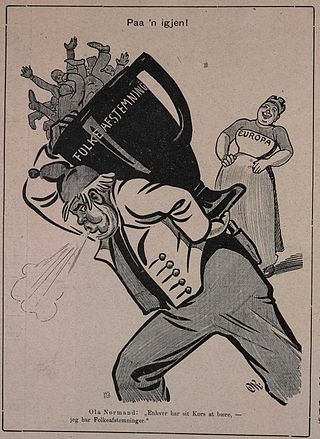
The mile, sometimes the international mile or statute mile to distinguish it from other miles, is a British imperial unit and United States customary unit of distance; both are based on the older English unit of length equal to 5,280 English feet, or 1,760 yards. The statute mile was standardised between the Commonwealth of Nations and the United States by an international agreement in 1959, when it was formally redefined with respect to SI units as exactly 1,609.344 metres.

John Doe (male) and Jane Doe (female) are multiple-use placeholder names that are used in the United States and the United Kingdom when the true name of a person is unknown or is being intentionally concealed. In the context of law enforcement in the United States, such names are often used to refer to a corpse whose identity is unknown or cannot be confirmed. These names are also often used to refer to a hypothetical "everyman" in other contexts, like John Q. Public or "Joe Public". There are many variants to the above names, including John/Jane Roe, John/Jane Smith, John/Jane Bloggs, and Johnie/Janie Doe or just Baby Doe for children.

Kangaroo Jack is a 2003 buddy comedy film directed by David McNally from a screenplay by Steve Bing and Scott Rosenberg with a story by Bing and Barry O'Brien. It is also produced by Jerry Bruckheimer with music by Trevor Rabin. The film tells the story of two childhood friends who get caught up with the mob and are forced to deliver $50,000 to Australia, but things go haywire when the money is lost to a wild kangaroo. It stars Jerry O'Connell, Anthony Anderson, Estella Warren, Michael Shannon and Christopher Walken, with Adam Garcia as the uncredited voice of the titular character.
A. N. Other is used as a placeholder name or, less commonly, a pseudonym used by a person wishing to remain anonymous. It is most used in the United Kingdom, often written as AN Other. Occasionally it may be abbreviated to ANO, or—in cases where a female name is expected—rendered as Ann(e) Other.

A mongrel, mutt, or mixed-breed dog is a dog that does not belong to one officially recognized breed, including those that result from intentional breeding. Although the term mixed-breed dog is sometimes preferred, many mongrels have no known purebred ancestors.

The standard 52-card deck of French-suited playing cards is the most common pack of playing cards used today. In English-speaking countries it is the only traditional pack used for playing cards; in many countries of the world, however, it is used alongside other traditional, often older, standard packs with different suit systems such as those with German-, Italian-, Spanish- or Swiss suits. The most common pattern of French-suited cards worldwide and the only one commonly available in English-speaking countries is the English pattern pack. The second most common is the Belgian-Genoese pattern, designed in France, but whose use spread to Spain, Italy, the Ottoman Empire, the Balkans and much of North Africa and the Middle East. In addition to those, there are other major international and regional patterns including standard 52-card packs, for example, in Italy that use Italian-suited cards. In other regions, such as Spain and Switzerland, the traditional standard pack comprises 36, 40 or 48 cards.

The Princeton Review is an education services company providing tutoring, test preparation and admission resources for students. It was founded in 1981, and since that time has worked with over 400 million students. Services are delivered by 4,000+ tutors and teachers in the United States, Canada and international offices in 21 countries.; online resources; more than 150 print and digital books published by Penguin Random House; and dozens of categories of school rankings. The Princeton Review's affiliate division, Tutor.com, provides online tutoring services. The Princeton Review is headquartered in New York City and is privately held. The Princeton Review is not associated with Princeton University.

John Q. Public is a generic name and placeholder name, especially in American English, to denote a hypothetical member of society, deemed a "common man", who is presumed to represent the randomly selected "man on the street".

Placeholder names are intentionally overly generic and ambiguous terms referring to things, places, or people, the names of which or of whom do not actually exist; are temporarily forgotten, or are unimportant; or in order to avoid stigmatization, or because they are unknowable or unpredictable given the context of their discussion; to de-emphasize in which event the precise specification thereof is otherwise impossible, or to deliberately expunge.

Ola Nordmann is a national personification of Norwegians, either for individuals or collectively. It is also used as a placeholder name. The female counterpart is Kari Nordmann, and collectively they are referred to as Ola og Kari Nordmann (Ola and Kari Nordmann).
The phrase "Tom, Dick, and Harry" is a placeholder for unspecified people. The phrase most commonly occurs as "every Tom, Dick, and Harry", meaning everyone, and "any Tom, Dick, or Harry", meaning anyone, although Brewer's Dictionary of Phrase and Fable defines the term to specify "a set of nobodies; persons of no note".
Joe Shmoe, meaning "Joe Anybody", or no one in particular, is a commonly used fictional name in American English. Adding a "Shm" to the beginning of a word is meant to diminish, negate, or dismiss an argument. It can also indicate that the speaker is being ironic or sarcastic. This process was adapted in English from the use of the "schm" prefix in Yiddish to dismiss something; as in, "sale, schmale". While "schmo" is thought by some linguists to be a clipping of Yiddish שמוק "schmuck", that derivation is disputed.

The everyman is a stock character of fiction. An ordinary and humble character, the everyman is generally a protagonist whose benign conduct fosters the audience's identification with them.

When the Wind Blows is a 1986 British adult animated disaster film directed by Jimmy Murakami based on Raymond Briggs' graphic novel of the same name. The film stars the voices of John Mills and Peggy Ashcroft as the two main characters and was scored by Roger Waters. The film recounts a rural English couple's attempt to survive a nearby nuclear attack and maintain a sense of normality in the subsequent fallout and nuclear winter.
The terms average Joe, ordinary Joe, regular Joe, Joe Sixpack, Joe Lunchbucket, Joe Snuffy, Joe Blow, Joe Schmoe, and ordinary Jane, average Jane, and plain Jane, are used primarily in North America to refer to a completely average person, typically an average American. It can be used both to give the image of a hypothetical "completely average person" or to describe an existing person. Parallel terms in other languages for local equivalents exist worldwide.
The College Football All-Southern Team was an all-star team of college football players from the Southern United States. The honor was given annually to the best players at their respective positions. It is analogous to the All-America Team and was most often selected in newspapers. Notable pickers of All-Southern teams include John Heisman, Dan McGugin, George C. Marshall, Grantland Rice, W. A. Lambeth, Reynolds Tichenor, Nash Buckingham, Innis Brown, and Dick Jemison.
Citizen X or CitizenX may refer to:

In Polish culture, Jan Kowalski is a placeholder name for an average Polish person, the meaning being similar to "Average Joe".











